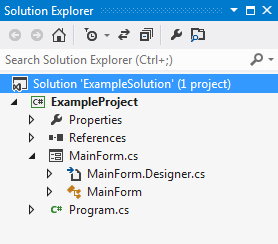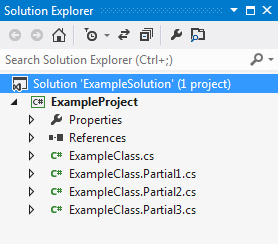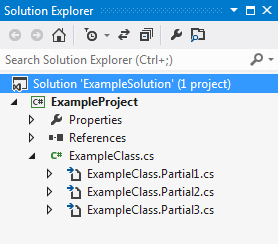Anyone who has worked with Visual Studio will have noticed that the IDE has a way of grouping related files within a single item in the project explorer.
This arises in a number of common situations:
- The grouping of Form.cs and Form.Designer.cs in WinForms projects.
- The grouping of Window.xaml and Window.xaml.cs in WPF projects.
- The grouping of Page.aspx and Page.aspx.cs in pre-MVC ASP.NET projects.
As an example, we can see that MainForm.cs is grouped with MainForm.Designer.cs in this simple WinForms project:

But how do we do this ourselves?
OK, this is a great feature, but it'd be neat if we could do it ourselves, too. Luckily, we can!
For a worked example, let's say we have a class that is broken down into a number of files, each containing a partial class with a subset of functionality from the main class.

If we open up the .csproj file, we can see that this is set out as follows:
<Compile Include="ExampleClass.cs" />
<Compile Include="ExampleClass.Partial1.cs" />
<Compile Include="ExampleClass.Partial2.cs" />
<Compile Include="ExampleClass.Partial3.cs" />
To group all of the partial classes underneath the main class, all we have to do is add a DependentUpon attribute to the elements we want to group. I'll let the XML speak for itself:
<Compile Include="ExampleClass.cs" />
<Compile Include="ExampleClass.Partial1.cs">
<DependentUpon>ExampleClass.cs</DependentUpon>
</Compile>
<Compile Include="ExampleClass.Partial2.cs">
<DependentUpon>ExampleClass.cs</DependentUpon>
</Compile>
<Compile Include="ExampleClass.Partial3.cs">
<DependentUpon>ExampleClass.cs</DependentUpon>
</Compile>
This gives us the following result - exactly what we wanted:
